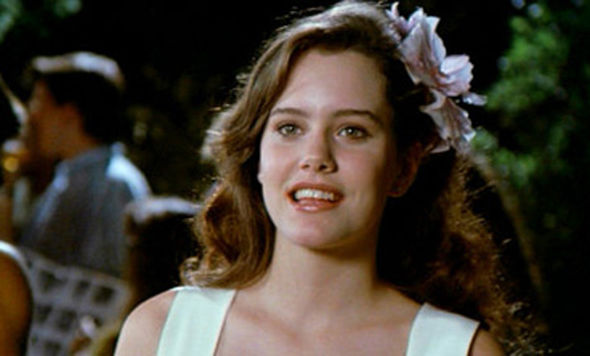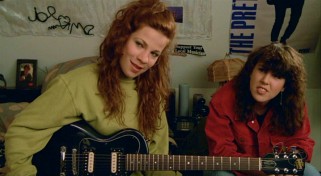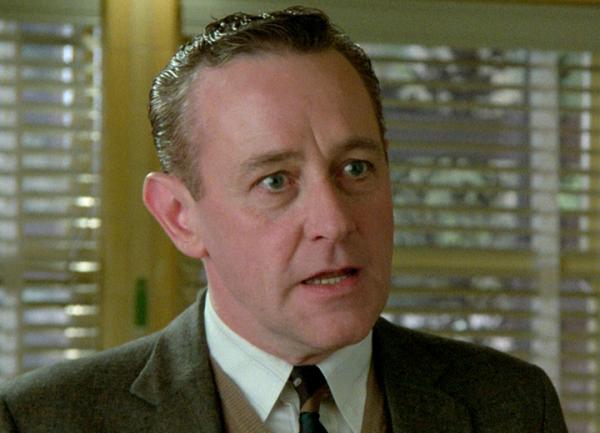By Brian Richards | Film | May 3, 2019

Most teenagers who decide to go out and get their first jobs usually go with the familiar and reliable places that teenagers usually start at when joining the workforce. Fast food restaurants, department stores, supermarkets. Places where they learn why good customer service, being a good customer who isn’t a spoiled a**hole, hard work, and responsibility are of crucial importance.
Cameron Crowe, however, aimed much higher, and at the age of fifteen, right after he graduated high school, he got a job working as a journalist at Rolling Stone magazine.
Crowe wrote articles and conducted interviews with artists such as The Allman Brothers Band, David Bowie, The Eagles, Lynyrd Skynyrd, and Neil Young. Those years of experience led to an assignment in which he went undercover as a high school student at Claremont High School in San Diego for a year, and pretended to be a student, as he wrote about the teenagers he crossed paths with, and his experiences with them. His book based on those exploits, Fast Times At Ridgemont High, was later adapted into a film by director Amy Heckerling and by Crowe himself, who wrote the screenplay. After he worked on Fast Times, he followed that up by writing the screenplay for The Wild Life. He soon ended up crossing paths with legendary writer/producer/director James L. Brooks, who approached Crowe about making his next film and writing the screenplay for it. After first crafting the story in novella form, and then turning it into a screenplay, that screenplay became Say Anything…, which opened in theaters on April 14, 1989.
Say Anything… tells the story of Lloyd Dobler and Diane Court (John Cusack, Ione Skye), who have both just graduated from high school. Diane is class valedictorian, and her scholastic achievements are so impressive that she has won a fellowship to attend school in England. Lloyd is a good-natured optimist who has no idea what he wants to do as an actual career, other than the fact that he doesn’t want to buy, sell, or process anything (or buy anything sold or processed, or process anything that is sold or bought), and that he seriously wants to pursue kickboxing for a living. Lloyd’s attraction to Diane is a strong one, despite his two best friends, Corey and D.C. (Lili Taylor, Amy Brooks), thinking that she is way out of his league, but he refuses to let that stop him from asking her out. Lloyd and Diane’s first date is an awkward one (mainly because it occurs at a massive graduation party that everyone is attending), but the two of them end up connecting with one another, and their growing mutual attraction ends up becoming a full-blown relationship. But Diane’s loving and protective father, Jim (played by the late, great John Mahoney) doesn’t entirely approve of her relationship with Lloyd, mainly because of his seeming lack of ambition, and also because she will be leaving the country in the next few months. If that isn’t enough to threaten Lloyd and Diane’s relationship, Diane is forced to confront a horrible secret that Jim has been keeping from her, one that is capable of turning both of their lives upside down, and possibly ending the romance and happiness between Lloyd and Diane just as it has begun.
Say Anything… arrived at the end of the Eighties, a decade that is known for the release of numerous teen movies. Particularly teen movies written and directed by John Hughes, and they are remembered for making teenagers look cool, witty, and smart at all times, and for making adults (whether they were parents or not) look completely worthless when they actually would appear onscreen and not be absent for various reasons. Outside of the fact that Lloyd’s parents aren’t present due to being stationed at an Army base in Germany, Say Anything… took the road less traveled, and had many of its teenage characters being open and honest with each other about their emotions instead of trying to hide them with wisecracks and dickish behavior.

Lloyd is open about his feelings for Diane and his confusion about what he wants to do with his life. (As well as the fact that he’d like his older sister Constance to be a little more fun and to stop being so damn uptight.)

Diane is open about whether she should pursue a relationship with Lloyd, about how she missed out on so much in school, doesn’t have as many friends as she would like due to being so focused on her academics, and about how she is worried she is for her father and his possible legal troubles.

Corey can’t and won’t hide the fact that she is still thinking about her deceitful ex-boyfriend, Joe (and the fact that she has his photos and memorabilia all over her bedroom doesn’t help). Even D.C. finally opens up to Corey, and confronts her about the fact that she always speaks over her, and hardly ever lets her talk. Both of them, along with their friend, Rebecca (Pamela Segall), know how fortunate Diane is to have Lloyd be a part of her life, as evidenced by the fact that when they ask themselves the question, “If you were Diane Court, would you honestly fall for Lloyd?,” they all inevitably arrive at the same conclusion: Yes, they would.
This courtesy is also offered to minor characters who get less screentime, but who still make their presence felt in what they choose to say and how they say it. The two girls at Vahlere’s graduation party who are flabbergasted as they eavesdrop on Diane talking on the phone to Jim, and putting him at ease about her night out with Lloyd, but who still sign her yearbook and ask her to her sign theirs, while also giving her advice on how to deal with nosy parents. (Granted, that doesn’t stop them from giggling derisively at Corey as she sings one of her sixty-three songs about Joe, but it’s something.) Sheila, who also has mean-girl tendencies, as well as an over-reliance on air quotes, tells Diane that despite how competitive they were with each other in school, it was that sense of competition with “Diane Court, whoa” that made her step her game up academically and work much harder to get into the colleges she wanted. Mrs. Evans (played by the goddess Bebe Neuwirth), Lloyd’s high-school guidance counselor who is determined to help him figure out what he wants to do for a career after he graduates, but knows better than to push him or ruin his good time with his friends. (She could easily be Tami Taylor from Friday Night Lights, minus the Southern accent.) Joe and his friends hanging out at the Gas-N-Sip, as they try to console Lloyd after his breakup with Diane by giving him the sort of useless and hypermasculine advice that can be heard in any barbershop. (And any attempt at deviating from that by showing actual emotions? “Man, you’re bringing me down!”) Vahlere (Eric Stoltz), the friendly but mysterious 22-year-old recluse who comes out of hiding once a year to throw a massive graduation party and dress up as the school’s mascot while doing so. The IRS agent (played by legendary character actor Philip Baker Hall) who Diane speaks to in order to plead her father’s innocence is clearly empathetic to what Diane is going through, but who also goes out of his way to be honest and not sugarcoat what her father has been accused of, and who tells her that she shouldn’t let his crimes stop her from living her best life.

Even Jim, despite his many faults coming to light, is written and portrayed in a three-dimensional manner, and we never see him made out to look foolish or incompetent or uncaring, as a parent or as a person. We’re given plenty of time and reasons to see him as a kind and upstanding man who thinks the world of his daughter, and is clearly bursting with pride at seeing her realize her potential. Which makes it all the more shocking and heartbreaking when Diane realizes the truth about him, and also when Jim begins to realize (as evidenced by his quiet breakdown when we see him curled up in his bathtub) that the truth will eventually be brought to light. To quote Dalton Russell from Inside Man: The further you run from your sins, the more exhausted you are when they catch up to you. And when that truth finally comes to light, and Jim ends up inCARCERATED, LLOYD!, it doesn’t take too long for much of his true self (his utter contempt for Lloyd; his sense of entitlement regarding his freedom and to Diane’s love and to the money he stole from residents at the nursing home because “I made their lives better!;” even his actual hair color now that he no longer has access to hair dye) to finally surface.
The now-legendary inclusion of the classic Peter Gabriel song “In Your Eyes” was not intentionaL at first. Originally, the song that was supposed to be blasting from Lloyd’s boombox as he stood outside her home and sonically declared his love for her was actually going to be one of several songs by Fishbone (“Quality Of Life,” “Bonin’ In The Boneyard,” “Turn The Other Way”), which was also one of Cusack’s favorite bands, but Crowe felt that those songs weren’t as effective as he needed them to be for what the scene and Lloyd were trying to convey. So he decided to go with “In Your Eyes” instead and requested permission from Peter Gabriel in his film. Gabriel, however, didn’t want his song to be used in a film that ended with John Belushi dying from a drug overdose. This confused Crowe, as Say Anything… didn’t have John Belushi, or any drug overdoses of any kind. He soon realized that Gabriel mistakenly thought that Crowe was referring to the then-upcoming film Wired, a biopic starring Michael Chiklis as the late comedian John Belushi. Once that confusion was cleared up and Gabriel was shown a cut of Say Anything…, he agreed to let “In Your Eyes” be used in the film, and the rest is history. Mind you, what was then seen as swooning and romantic in terms of Lloyd using a love song playing on his boombox to let his ex-girlfriend know that he still loved her is now seen by some as somewhat disturbing and stalkerish and problematic, but…it’s still history.

Say Anything… went on to critical acclaim and box-office success (Roger Ebert was a huge supporter of the film upon its release and years later when revisiting it, his opinions not only didn’t change but became more passionate, especially when comparing its legacy to the many teen comedies and dramas that followed in its wake), which allowed Cameron Crowe to write and direct other films, such as Singles, which was and still is hailed for accurately capturing the growing grunge scene coming out of Seattle.
He then followed up with possibly the biggest success of his writing and directing career: Jerry Maguire, which starred Tom Cruise, Cuba Gooding Jr. (in the role that won him an Oscar for Best Supporting Actor), Renee Zellweger, Jerry O’Connell, Jay Mohr, Kelly Preston, Beau Bridges, and Regina King.
His semi-autobiographical film Almost Famous, about a 15-year-old boy who scores a writing gig with Rolling Stone, and tours with the rock band Stillwater as he writes an article about them, wasn’t nearly as successful at the box-office as Jerry Maguire. But it made a very strong impression on the awards circuit, winning an Oscar for Best Original Screenplay, a Grammy for Best Soundtrack Album, and two Golden Globes for Best Motion Picture (Musical or Comedy) and Best Supporting Actress for Kate Hudson (no, not our Kate Hudson who loves Renegade and writing erotic fanfic about the Night King that is filthier than Donald Trump’s hamper, the other Kate Hudson)
In 2001, Crowe wrote and directed Vanilla Sky, which was based on the Spanish-language film Abre Los Ojos (Open Your Eyes), and starred Tom Cruise, Penelope Cruz, Cameron Diaz, Jason Lee, and Kurt Russell. The reviews were very mixed, and left many an audience saying “What the f**k was that?!” upon seeing it for themselves.
His last three feature films didn’t fare much better with critics or audiences. There was Elizabethtown, featuring Orlando Bloom and Kirsten Dunst…
We Bought A Zoo, with Matt Damon and Scarlett Johannsson…
And Aloha, starring Bradley Cooper, Rachel McAdams, and Emma Stone as Air Force Captain Allison Ng, who is supposed to be one-quarter Chinese and one-quarter Hawaiian. It was the most (and only) memorable thing about the film, for all of the wrong reasons, and not only caused Crowe to apologize for his casting decision upon the film’s release, but even caused Emma Stone to shout an apology to Sandra Oh earlier this year when she co-hosted the Golden Globe awards and made a joke in the opening monologue that used Aloha as a punchline.
In 2014, NBC hired writer Justin Adler and producer Aaron Kaplan to develop a television adaptation of Say Anything…. The premise of this series, according to Deadline Hollywood:
Set in present day, the Say Anything… series was to pick up up 10 years later. Lloyd has long since been dumped by Diane, and life hasn’t exactly turned out like he thought. But when Diane surprisingly returns home, Lloyd is inspired to “dare to be great” once again, get Diane back and reboot his life.
The biggest obstacle to this adaptation, other than the fact that no one was asking for this to be made? Cameron Crowe was completely unaware of this, and when both he and John Cusack found out about it, they made their displeasure about the project very public.
Regarding the announcement of a "Say Anything" tv show… @JohnCusack, @IoneSkye1 and I have no involvement… except in trying to stop it.
— Cameron Crowe (@CameronCrowe) October 7, 2014
Hell no !! “@readdreamwrite: .@johncusack Are you or @CameronCrowe involved with this series?http://t.co/CAIfVIR9L3”
— John Cusack (@johncusack) October 7, 2014
No end to the exploitation of other people's sincere efforts in shameless slime “@auntyK007: @CameronCrowe No imagination for new ideas”
— John Cusack (@johncusack) October 7, 2014
Not too long after they voiced their displeasure, the project was soon shelved and didn’t go any further.
Say Anything… is one of the few teen comedies/dramas to stand the test of time, and actually age gracefully while doing so. Much of it is because of Cameron Crowe’s writing and direction, as well as the terrific and memorable performances by John Cusack, Ione Skye, John Mahoney, Lili Taylor, Amy Brooks, Joan Cusack, and the rest of the supporting cast. It is, as Lloyd would call it, a great success story, and here’s to watching, quoting, and discussing it for another thirty years.